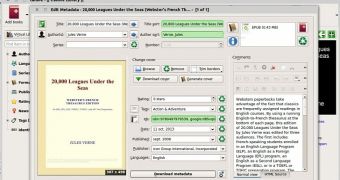Calibre, the best eBook reader, editor, and library management software available on the Linux platform, has advanced to version 1.38.
Calibre is mainly used as an eBook reader or for eBook conversion, but the developer also integrated a very powerful book editing feature that has been improved over the past few editions through the addition of various features and fixes.
“A ‘Live CSS’ tool that shows all the style rules for the tag you are currently editing. You can use it to easily jump to any style rules that affect the current tag. Enable it via View->Live CSS,” reads the changelog. More and more editing features have been introduced in the application and slowly, but surely, this is becoming the best software of its kind.
According to the developer, an option to hide the book rating in the cover browser has been added (it can be found in Preferences > Look & Feel > Cover Browser), the language specified in the document default style for the DOCX format is now used if no language has been defined in the metadata, a regression that sometimes caused incorrect syntax highlighting when non-breaking spaces/typographic hyphens were present in the text has been fixed, and a regression that broke the compare books tool when used outside the book editor has been corrected.
Also, the Woblink plugin has been updated in order to better handle the changes to the Woblink website, the buggy conversion made by Microsoft Word when changing newlines in the document summary is now ignored by Calibre, the Check Book function is no longer failing if a binary file such as an image or font is mislabeled in the OPF as being a text file, and a bug that was preventing multiple instances of Calibre from being used by different user accounts on the same computer has been corrected.
If you’ve decided to compile your own build of Calibre, be warned. It has many dependencies and it can be quite tricky. Fortunately, the developer also provides a complete list of dependencies, if you feel brave enough. He also has a very handy way of installing the application by entering a single command in the terminal, which can be found in the download section.
If you don't want to compile Calibre on your own, the developer also provides a simple command line that takes care of the entire installation, making the entire process a lot smoother. You can also check out our review of Calibre and download Calibre 1.38 from Softpedia.

 14 DAY TRIAL //
14 DAY TRIAL //